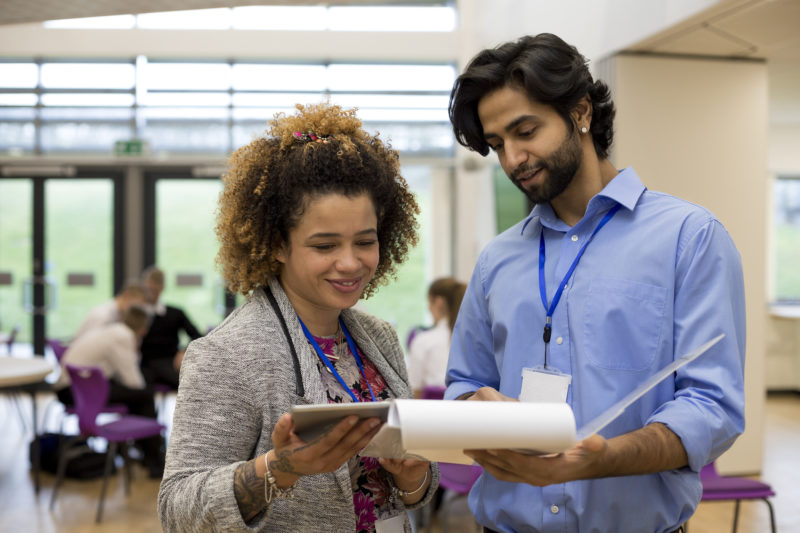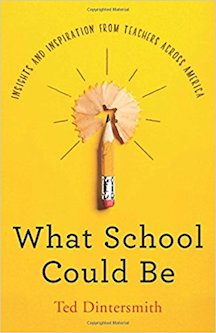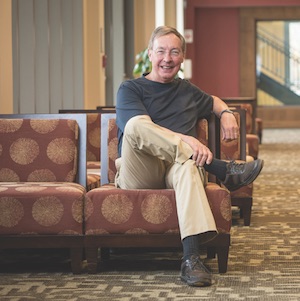 When author and innovation expert Ted Dintersmith set out to visit public schools in all fifty states during a single school year, he hoped to find solutions to the most vexing problems facing classroom educators. He soon discovered that the very solutions he sought had already been found – by the teachers themselves. All we need to do, he says in his new book, What School Can Be: Insights and Inspiration from Teachers Across America, is to listen to them and trust in their creativity and expertise.
When author and innovation expert Ted Dintersmith set out to visit public schools in all fifty states during a single school year, he hoped to find solutions to the most vexing problems facing classroom educators. He soon discovered that the very solutions he sought had already been found – by the teachers themselves. All we need to do, he says in his new book, What School Can Be: Insights and Inspiration from Teachers Across America, is to listen to them and trust in their creativity and expertise.
NEA Today sat down with Dintersmith to talk about the extraordinary educators he met during his cross-country journey.
First of all, tell us what an innovation expert is.
Ted Dintersmith: It’s someone who understands what constitutes a legitimate innovation, what types of people can make innovation happen, and what conditions are conducive to innovative people and organizations. I spent my career in this world, running an innovative start-up business, spending more than two decades in venture capital, and supporting innovative non-profit initiatives. The trip that inspired my book was all about listening to and learning from remarkably innovative teachers showing us how to prepare students for a world of innovation.
You set out on your cross-country journey to raise awareness about the need for innovation in our schools, but your goals expanded. Why?
TD: As my nine-month immersion unfolded, I stayed true to raising awareness, but was stunned by the remarkable innovative teachers I was meeting along the way. They know there’s urgency in reimagining school and moving beyond obsolete metrics, and I was blown away, and a bit humbled, by their insights, perspective, and classroom practices.
What else surprised you about the educators you met?
TD: For starters, every single one struck me as dedicated, caring, and willing to go to the ends of the earth to help the children in their care. These teachers don’t get the trust, respect, and compensation they deserve, but they manage to power through it to fight for better lives for their students. That is inspiring to observe, and something all adults in our country need to be aware of.
 What were the school conditions that allowed the teachers you met to become extraordinary educators?
What were the school conditions that allowed the teachers you met to become extraordinary educators?
TD: It starts with trust. The innovative practices I write about were created and driven by classroom teachers, but supported by administrators who, in different ways, had the back of their teachers. Then, I think it’s important to make the surrounding community aware of the need to reimagine school. If you’re a lone wolf teacher who has students enthusiastically taking on ambitious and authentic challenges, working in teams, being held accountable to a high standard of accomplishment, you still can get wailed on for doing things differently. It’s really important to bring the entire community (parents, school boards, local businesses) into the discussion of how best to prepare our students for a very different world. Finally, I found that teachers — counter to what many assume — are not averse to being held accountable, but want to be held accountable to standards that matter, and to standards they have a voice in designing. Given trust, community support, and well-conceived standards, our teaching force can be unstoppable.
What other qualities do extraordinary educators share?
TD: The classrooms I was blown by away were, in the specifics, quite distinct. But they shared certain common principles. These teachers were creating learning environments where students master what they study, develop essential skillsets and mindsets, have the agency to blossom into self-directed learners, and approach their school work with a sense of deep purpose. I use the acronym PEAK (purpose, essentials, agency, and knowledge) to keep these core principles in mind.
What outdated modes of education need to end and what new modes should we usher in?
TD: The outdated models are the conditions and metrics we impose on our schools, with public schools bearing the brunt of these constraints. In the world of innovation, young adults need to be creative problem solvers, critical thinkers, collaborators, communicators, and responsible citizens (they all start with ‘C’ for some reason!). But when we hold teachers and schools accountable to obsolete, generally poorly-designed tests, we put our teachers in a horrible dilemma. In meeting and talking with thousands of teachers, they — far more than legislators, policymakers and mega-foundations — understand that these tests of low-level and narrow competencies aren’t preparing our kids for their futures, and all too often driving the joy and real learning from our classrooms. What I find as I travel, though, is that there is a deluge of pent-up innovation in our teaching force, which would be unleashed if we just trusted them to engage and inspire their students.
 Ted Dintersmith
Ted Dintersmith
What did you learn from you trip that made you hopeful?
TD: There’s so much to be hopeful about. Someone said to me recently, “The dam may be about to break.” I think they’re right. So many have seen the abject failure of the reform agenda — from NCLB to RTTT to today’s lack of national education leadership. It’s time to move on, and start trusting those who own the consequences of what happens in the classroom — our teachers and students. They are more than up to the challenge, and are doing amazing things all over the country. Time to unleash them!
We’re seeing very encouraging signs of what happens when people join together to make real, and informed, change in our country — from the student-led movement to enact sensible policies on guns to the teacher-led movement to provide adequate resources to our schools. We’re at a real inflection point in the future of our country, and we can’t afford to tinker around the edges of our most pressing challenges. I put education at the top of the list, since if we launch young adults into life as purpose-driven problem solvers, we will be in a position to make headway across the board. But if we continue to let the reform agenda rule the day, with its focus on testing, accountability, and college-ready, we will leave millions of young adults vulnerable in a world where machine intelligence is advancing rapidly, erasing millions of routine jobs.
Can teachers lead the way to transforming our schools?
TD: Not only can they, but they are doing it, all across the country. I was so inspired as I traveled to see the positive change that’s happening. In every community I visited, I found remarkable, inspiring innovations led by classroom teachers. If we can celebrate these practices, and put in place the conditions that let all classroom teachers do what they entered the profession to do — engage and inspire our children — we’ll be entering an education period that might well be called a modern day Renaissance.







